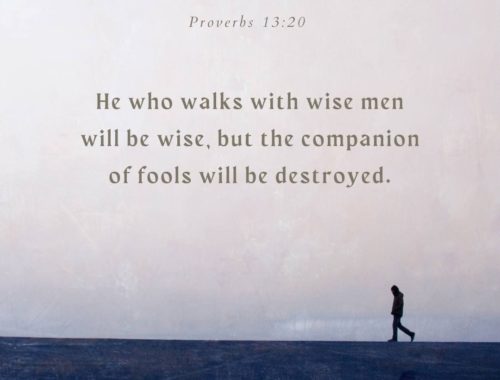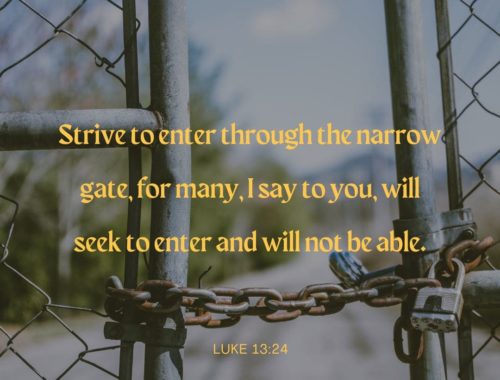2 Samuel Chapter 14

13 So the woman said: “Why then have you schemed such a thing against the people of God? For the king speaks this thing as one who is guilty, in that the king does not bring his banished one home again. 14 For we will surely die and become like water spilled on the ground, which cannot be gathered up again. Yet God does not take away a life; but He devises means, so that His banished ones are not expelled from Him.
~ 2 Sam 14:13-14
If you recall in the last chapter, Absalom fled from David after he murdered Amnon. Even though this was a violent and evil act, David’s heart was still for Absalom. He longed for him (2 Sam 13:39).
This chapter starts by telling us how Joab arranged for a woman to speak to David about bringing back Absalom after years of being away.
The estrangement between a father and son has been played out many times over the years. Because of an unfortunate event, a careless remark, or a great wrong, the son or father makes vows to never wanting to see the other party again.
And nothing would make them change their mind.
If we struggle with this same scenario in our lives, consider this story.
The woman tells King David a story about a husband who is dead, and two sons who got into a fight, one killing the other. And now the whole family wants to put the surviving son to death. This would leave her without a son and an heir to the family. David immediately said this was not right and gave an order to protect the son and allowed him to return home safely.
While not as dramatic as Nathan telling David, “You are the man!” when telling a story to show David his sin, it is equally direct when the woman tells David that he has convicted himself (vs 13) in the conflict he has with his son Absalom.
In her plea to David, she uses the words on top of this sharing to argue for reconciliation.
God does not take away life; instead, He devises ways so that a banished person may not remain estranged from Him (vs 14).
The story of reconciliation is very clear here.
Reconciliation is also what the Bible is all about.
We read this in the New Testament when Jesus came in the flesh to open up this new and living way back to God.
Paul said,
“We implore you on Christ’s behalf: Be reconciled to God. God made him who had no sin to be sin for us, so that in him we might become the righteousness of God”
~ 2 Cor 5:20-21
Even in the Old Testament, through this story we read today, it speaks about reconciliation.
But … there is always a ‘but’ somewhere isn’t it… let’s consider deeper.
A brother shared this with me and I felt it important enough to share. If all we got out of this story is that reconciliation is always good and OK – then we may need to rethink again.
Sin without repentance is clearly unacceptable to God. This is what the Bible has consistently shown us.
Let us compare the stories of the ‘wise woman’ and the prophet Nathan and their implications:
- Absalom did not repent of his sin of murder but David did.
Do we need to repent to be reconciled to God?
We know from both characters what the answer is. When David’s sin was laid bare before him, he did not go into hiding – from God and man. Instead, he went before God in deep repentance and a contrite heart. While he still suffered from the consequences of his action, he was reconciled with God.
Absalom, on the other hand, showed no sign of repentance. When he fled, he did so to escape the possible judgement and punishment of David. And events after this shows us that he did not consider his sin of murder to be anything wrong.
So while this story showed how Absalom was ‘reconciled’ with David, there was no remorse over his sin. - The story of the wise woman misleadingly downplays the murder of Amnon to that of two brothers fighting.
The parable of Nathan accurately portrays the callous killing of Uriah resulting from the selfishness of David – in the killing of the ewe lamb is the murder of Uriah and the lustful (he didn’t want to keep Bathsheba nor the child at first) and covetous appropriation of Uriah’s wife.
The story the woman gave to David painted a picture that David was the person that was wrong for banishing Absalom and should bring him back.
And if one makes a judgement based purely on the story – it does sound reasonable and right.
I honestly struggled with this story as while the wise woman seemed to give good counsel, deep in my heart, I knew that this was not correct.
The question is this: Do we make judgments without checking facts and also the law just by hearing appropriate analogies or statements?
Once I could answer this question, I realised that I no longer struggled anymore. If we took the woman’s story at face value, it was right. But when we know the real background of the evil actions of Absalom, we would not have been so quick to make the same judgement.
So this is an important lesson for me today. Always reflect on what you see and hear against the teachings of the Bible and find out the true facts of the case before making judgements.
- David was the perpetrator in Nathan’s parable and reacted correctly in repentance.
David was the judge in the wise woman’s story and reacted wrongly by forgiving an unrepentant criminal.
The question is this: Do we have the right to forgive when God does not forgive?
We may think it is the humane and moral thing to do and to always forgive. Are we not obeying Jesus’ teaching when we practice forgiving seventy-seven times?
Then how can you tell me that there are times when we should not forgive?
This story of reconciliation today shows us that there are limits.
In church, while we are taught to be loving and forgiving, we also need to see if the person in question is truly repentant or not. Some who have departed from the church, including wayward preachers, have shown that despite the loving efforts of many, remain unrepentant of their wayward sins.
This is so so important in today’s world where wrong is made to be right. The proponents of truth and justice are deemed as old fashioned, unforgiving and not inclusive.
While it is the will of God to be reconciled as I said earlier, there is a need to see if that person we are striving to be reconciled with has repented of their wrongs.
It is also important for us to consider ourselves in this too. Have we also done wrong and need to sincerely and honestly repent before God too?
God is the one that sees and judge.
May we learn together today on what is true reconciliation.
2 Samuel Chapter 13
2 Samuel Chapter 15
You May Also Like

2 Samuel Chapter 10 – Who are your Allies?
August 16, 2021